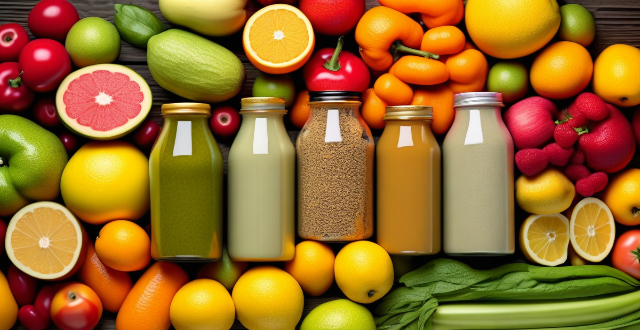Detox drinks are popular beverages that claim to remove toxins from the body and aid in weight loss. They typically contain fruits, vegetables, herbs, and other ingredients believed to have detoxifying properties. However, the effectiveness of detox drinks for weight loss is not well-supported by scientific research. While they may offer potential benefits such as increased hydration and improved digestion, relying solely on detox drinks can lead to nutrient deficiencies and short-term results. If you choose to incorporate detox drinks into your weight loss journey, it's important to do so safely and effectively by choosing wholesome ingredients, practicing moderation, and consulting with a healthcare professional. A comprehensive approach involving a balanced diet, regular exercise, and lifestyle changes is essential for achieving long-term weight loss goals.

Can Detox Drinks Really Aid in Weight Loss?
Detox drinks have become increasingly popular in recent years, with many people claiming that they can aid in weight loss. But can these drinks really help you shed those extra pounds? Let's explore this topic in detail.
What Are Detox Drinks?
Before we dive into the effectiveness of detox drinks for weight loss, let's first understand what they are. Detox drinks are beverages that claim to remove toxins from your body and improve overall health. They often contain a combination of fruits, vegetables, herbs, and other ingredients that are believed to have detoxifying properties.
Types of Detox Drinks:
- Fruit and Vegetable Juices: These are made by juicing various fruits and vegetables, such as apples, carrots, beets, and kale.
- Tea-Based Drinks: Green tea, oolong tea, and herbal teas are common choices for detox drinks.
- Water Infusions: These involve adding fruits, vegetables, or herbs to water and allowing them to steep for several hours or overnight.
Do Detox Drinks Work for Weight Loss?
Now, let's address the main question: Can detox drinks really aid in weight loss? The answer is not straightforward, as there are both potential benefits and drawbacks to consider.
Potential Benefits:
1. Increased Hydration: Drinking more fluids, especially water-based drinks, can help you feel fuller and reduce calorie intake.
2. Improved Digestion: Some detox drinks contain fiber-rich ingredients that can promote regular bowel movements and support digestion.
3. Reduced Cravings: Drinking detox beverages may help curb cravings for sugary or unhealthy foods by providing a low-calorie alternative.
Potential Drawbacks:
1. Lack of Scientific Evidence: There is limited research supporting the effectiveness of detox drinks for weight loss. Many claims are based on anecdotal evidence rather than scientific studies.
2. Insufficient Nutrients: Relying solely on detox drinks for weight loss may lead to nutrient deficiencies, as these beverages often lack essential vitamins, minerals, and protein.
3. Short-Term Results: Any weight loss achieved through detox drinks is likely temporary, as it does not address long-term lifestyle changes needed for sustained weight management.
How to Use Detox Drinks Safely and Effectively
If you decide to incorporate detox drinks into your weight loss journey, here are some tips to ensure you do so safely and effectively:
Choose Wisely:
- Look for detox drinks that contain wholesome ingredients like fresh fruits, vegetables, and herbs.
- Avoid drinks with added sugars, artificial sweeteners, or preservatives.
Moderation is Key:
- Don't rely solely on detox drinks for weight loss; instead, use them as part of a balanced diet and exercise plan.
- Be mindful of portion sizes and avoid overconsumption of even healthy beverages.
Consult a Professional:
- Before starting any new diet or supplement regimen, including detox drinks, consult with a healthcare professional or registered dietitian.
In conclusion, while detox drinks may offer some potential benefits for weight loss, they should not be relied upon as a sole solution. A comprehensive approach involving a balanced diet, regular exercise, and lifestyle changes is essential for achieving and maintaining long-term weight loss goals.